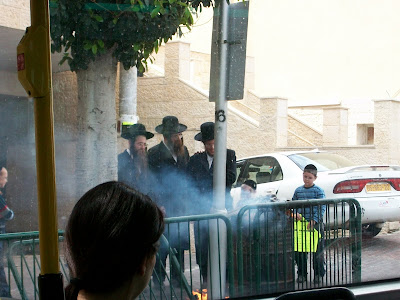BY
AMOS
View of the Post Office and McDonald's in Hadar at Herzl and Nevi'im Streets
Azad, a restaurant in the Hadar neighborhood of Haifa (official name, Hadar ha-Karmel, Splendor of the Carmel) has made the national news after a soldier complained that the restaurant's hostess was refusing to serve him because he had come in uniform (see
full story). Asked by reporters, the hostess reiterated the restaurant's policy of refusing service to uniformed would-be diners, whether they are IDF soldiers, ambulance personnel, police officers, firewomen, or scouts. The manager on duty explained that the meaning of the restaurant's name is "the free man," and that because "this is the policy [sic], it has to be respected and [the issue] shouldn't be taken to other places." Without saying so explicitly, she denied that the restaurant was discriminating against soldiers for ideological reasons, claiming that the owners are merely trying to maintain a certain atmosphere in the establishment. Meanwhile, city officials are threatening to review the restaurant's license.
Restaurants and clubs can ask patrons to adhere to dress codes, but the refusal to serve uniformed diners, most of whom will most likely be soldiers, police officers, or paramedics, is frankly speaking disgusting. These are servants of the public and they deserve to be seated at any restaurant they choose, even if it wants to maintain a formal atmosphere, provided they behave in a polite manner like all other patrons. As Israeli citizens, the owners of
Azad owe these men and women that much. If the restaurant's policy is ideologically-motivated and envisioned as some kind of statement against the state, it is a complete failure and amounts to discrimination.
The restaurant's owners are Arab Israelis. It will be hard for them to escape the perception that they are trying to make some kind of statement against the state and against people serving in the army. A
group on the social networking site Facebook, calling for a boycott of the restaurant, has attracted nearly 4,000 members. The tag line of the group warns that "racist comments will be deleted," but many of those who have joined interpret the restaurant's actions as part of a general antipathy toward the state and the army among Israel's Arabs. For more careful and nuanced views, look elsewhere.
The
neighborhood in which the restaurant is located is one of the poorest in the city. The largest subgroups in the population are haredi Jews, Arab Israelis, and recent immigrants from the former Soviet Union.


 I came across this store on Allenby Street in Tel Aviv. The sign on the right-hand sign reads, "Keep and remember the Sabbath day holy (because it is a source of blessing)". On the left-hand side, "Viagra pills may be obtained here," and below the sign, a row of bongs disguised as "air fresheners".
I came across this store on Allenby Street in Tel Aviv. The sign on the right-hand sign reads, "Keep and remember the Sabbath day holy (because it is a source of blessing)". On the left-hand side, "Viagra pills may be obtained here," and below the sign, a row of bongs disguised as "air fresheners".



